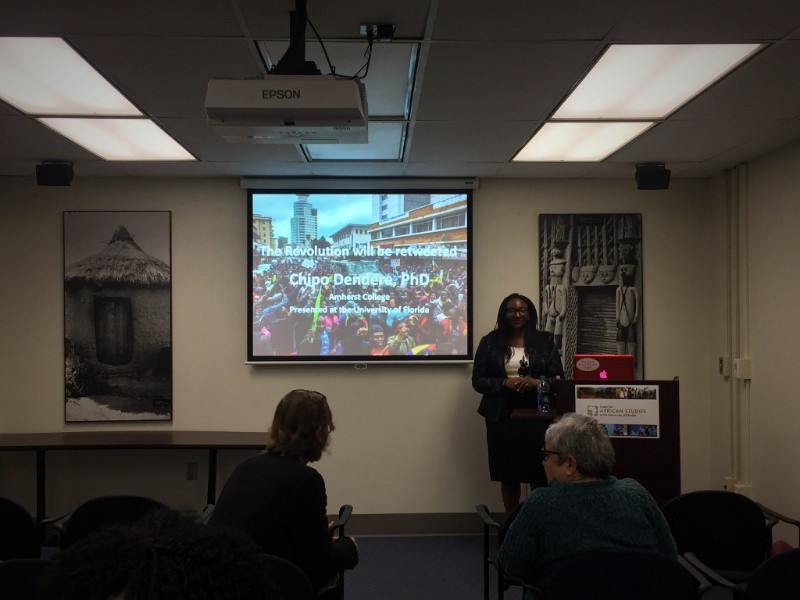On Friday afternoon, Chipo Dendere gave a refreshing presentation exploring the role that social media played in former Zimbabwean president, Robert Mugabe’s, resignation. In her talk titled “The Revolution will be Retweeted,” Dr. Dendere juxtaposes participatory media and military powers to highlight the complexities within the 2017 Zimbabwean coup d’état. She argues that an uneasy union of enemies banded in solidarity through social media under a shared objective: to give Mugabe his “red card.”
Dr. Dendere began by explaining the ways in which social media can increase (mostly) urbanite’s access to information, increase citizen engagement with politics and policies via rallies and marches, demystify politics and politicians, break the cycle of fear and increase participation of differently situated marginalized groups by providing a less vulnerable platform for citizens to publicly challenge positions of power. Throughout the presentation, she remained sensitive to social media’s ability to temper jokes in more serious political conversation. With more than 5 million Zimbabweans on Whatsapp daily, she also argued that these positive aspects of social media should not obscure its ability to create confusion, disseminate false information, circulate unregulated truths and redefine truths.
 When a Zimbabwean soldier appeared on international television announcing Mugabe’s house arrest, it appeared to be a political coup. After nearly four decades of unimpeded rule, Mugabe’s political downfall unfolded quickly. Analyzing reports from social media and news outlets, Dr. Dendere recounted several possible timelines with distinct catalyzing events. Was it the attempted arrest of Chiwenga or Mnangaagwa’s poisoning or Grace Mugabe’s choice to wear a white garment that was the first domino to fall? For six days the former President remained in power, while political commentators predicted on social media that Mugabe would resign after the military sanctioned Citizen’s March and a series of political speeches. Only after Parliament began impeachment proceedings did he finally step down.
When a Zimbabwean soldier appeared on international television announcing Mugabe’s house arrest, it appeared to be a political coup. After nearly four decades of unimpeded rule, Mugabe’s political downfall unfolded quickly. Analyzing reports from social media and news outlets, Dr. Dendere recounted several possible timelines with distinct catalyzing events. Was it the attempted arrest of Chiwenga or Mnangaagwa’s poisoning or Grace Mugabe’s choice to wear a white garment that was the first domino to fall? For six days the former President remained in power, while political commentators predicted on social media that Mugabe would resign after the military sanctioned Citizen’s March and a series of political speeches. Only after Parliament began impeachment proceedings did he finally step down.
By revisiting these events, Dr. Dendere explained that Zimbabwe’s transition of power was an extraordinary case in which a country subject to violence may have organized a non-violent coup. She argues that in Zimbabwe’s context, a traditional coup, traditional citizens’ movement and traditional elections would not have worked. Instead, the military general shook hands with former president and there may have been no shootings during public demonstrations. Instead, citizens were mobilized to march by the military and children held opposition signs saying that “Mugabe must go!” while foreigners walked the streets. By drawing out the interplay between violent and nonviolent elements, Dr. Dendere opens up the concept of ‘coup.’ While many details remain unclear, Dr. Dendere illustrates how humorous and ironic tweets and Facebook posts made the citizen solidarity movement to remove Robert Mugabe from office more palatable.